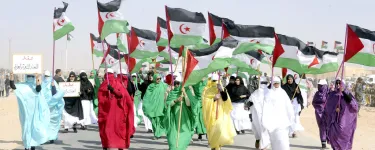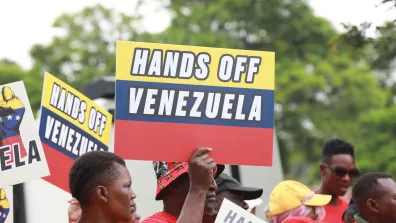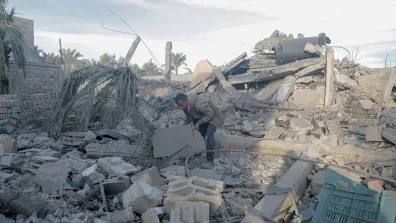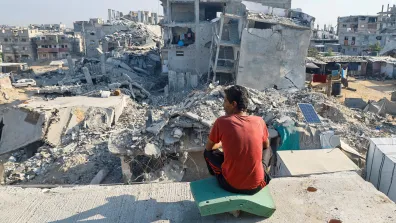The Western Sahara: 50 years of Morocco’s illegal occupation

Morocco has occupied Western Sahara since invading the territory in 1975. With the occupation reaching its 50th anniversary on 31 October 2025, the Saharawi people – an Indigenous group of the Western Sahara – continue to suffer human rights abuses under Morocco’s rule. The Saharawi people suffer discrimination in access to housing and land while around 400,000 Moroccan settlers benefit from state subsidies. More than 170,000 Saharawi live in refugee camps in south-west Algeria, dependent on aid, and endure a deepening humanitarian and climate crisis.
Now, the UK government has stated that it endorses Morocco’s plan which would side-line Saharawi hopes for self-determination[1]. Self-determination is the right of a people to choose how they govern themselves. It is an inalienable right – one that can never be taken away. The UK backs the Moroccan “autonomy plan” for Western Sahara, under which the Saharawi would only have authority over certain local matters including housing, education and cultural affairs; but crucially sovereignty – the authority of a state to govern itself - plus external affairs and defence, would be under the rule of Morocco.
Morocco’s occupation of Western Sahara
During European powers’ colonial rule of much of Africa, the Spanish controlled Western Sahara for almost one hundred years, until 1975. Morocco and Mauritania then both claimed the area, but in October 1975 the International Court of Justice (ICJ), the world’s highest court, ruled that their claims had no legitimacy – and the Saharawi people should be allowed to express their right to self-determination. Within weeks of the ICJ ruling, Morocco and Mauritania invaded Western Sahara. Much of the local population fled into the desert.
In 1978, Mauritania withdrew its claim to Western Sahara, but Morocco intensified its occupation. Only one-fifth of the territory was left unoccupied, controlled by the Saharawi people and called the Saharawi Arab Democratic Republic. Under the leadership of the Polisario Front, the national liberation movement of the Saharawi people, armed struggle for self-determination continued.
In 1991, the UN Settlement Plan outlined a free and fair referendum for the Saharawi people – whereby they could vote for independence, or integration with Morocco. But due to obstructions from Morocco and a lack of political will elsewhere, this has never taken place.
Despite the ICJ formally rejecting Morocco’s territorial claims to Saharawi land, and the United Nations regarding Western Sahara as a non-self-governing territory – pending decolonisation – Morocco’s occupation continues.
In June 2025, the then-UK Foreign Secretary, David Lammy, endorsed the Moroccan plan to place Western Sahara – unjustly – under Moroccan sovereignty.
Human Rights in Occupied Western Sahara
The Saharawi people living under Moroccan occupation suffer human rights violations by the Moroccan authorities. Morocco systematically prevents gatherings in Western Sahara supporting Saharawi self-determination, has obstructed the work of local human rights organisations, and beaten and detained activists and journalists.
In June 2025, UN experts criticised Morocco’s demolition of Saharawi homes, forced evictions, racial discrimination, and violence against Saharawi human rights defenders and journalists. While there is a dedicated United Nations Mission for the Referendum in Western Sahara (MINURSO) – established in 1991, it lacks the legal mandate to monitor and report on human rights in Western Sahara. It is the only modern UN peacekeeping mission without a legal mandate, leaving the Saharawi people at greater risk of abuse.
Stolen Natural Resources
As documented by Western Sahara Resource Watch, Morocco pillages the natural resources of the Saharawi, including their phosphates (a key component in fertiliser), fisheries, sand, and renewable energy. This deprives the Saharawi people of the economic and cultural benefits of their own resources. Morocco exploits these resources and trades them internationally, normalising Morocco’s illegal occupation of the Western Sahara.
For half a century, Morocco has exploited huge phosphate reserves in the Bou Craa region in the north of Western Sahara, exporting the resource overseas. In 2024 alone, Morocco extracted and exported approximately 1.45 million tonnes of phosphate rock – worth over £10 million.
Morocco exploits the marine resources off Western Sahara’s coastline, extracting fish stocks as well as benefiting from fishing licences sold to Russia, Japan and elsewhere – all to the loss of the Saharawi people.
Morocco positions itself as a global leader in renewable energy and in meeting climate commitments – but does so by developing green infrastructure on occupied land.
Morocco also benefits from the extraction and export of sand from Western Sahara – to Spain and beyond, boosting Spain’s tourism sector, for example, while depriving the Saharawi of potential benefits themselves. Between 2020 and 2024, Morocco exported over 900,000 tonnes of sand from the territory, with the majority destined for the Canary Islands.
Morocco’s occupation is backed by the US, Israel – and now the UK
Morocco’s control of the Western Sahara is supported by states anchored in settler-colonialism. The US and Israel have openly backed Morocco’s sovereignty over Western Sahara, in return for Morocco’s full diplomatic relations with Israel.
France followed suit in 2024, in coordination with French corporations eager to profit from business with Morocco in and around the Western Sahara – territory no longer seen as distinct from Morocco in the maps of the French foreign ministry.
The UK had consistently supported the Saharawi right to self-determination, until its official endorsement of Morocco’s plan in June 2025. War on Want wrote to the UK government expressing our concerns, and demanding that the it reverses this regressive policy change. So far, the only response has been a reassertion of its position.
Right against might
Parallels between the injustices suffered by the Saharawi and the Palestinian people – under Moroccan and Israeli occupations respectively – are plain to see. Indigenous peoples subjected to modern-day settler colonialism, illegal occupation and discrimination, forced displacement and exile, as well as the pillaging of their own natural resources with the collusion of foreign governments and corporations.
The ICJ has ruled that both Morocco and Israel’s occupations are illegal – in 1975 and 2024 respectively – but these oppressive occupations continue, with impunity.
International law, however, is clear. The Saharawi people must have their right to self-determination realised. We will continue to support this inalienable right - the UK government must as well.
[1] Written statements - Written questions, answers and statements - UK Parliament


